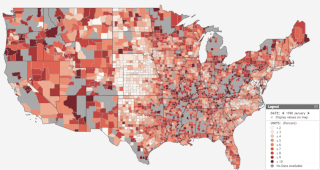
The United States Department of Labor (DOL) is a cabinet-level department of the U.S. federal government responsible for occupational safety and health, wage and hour standards, unemployment benefits, reemployment services, and some economic statistics; many U.S. states also have such departments. The department is headed by the U.S. Secretary of Labor.
The Railway Labor Act is a United States federal law on US labor law that governs labor relations in the railroad and airline industries. The Act, passed in 1926 and amended in 1934 and 1936, seeks to substitute bargaining, arbitration and mediation for strikes to resolve labor disputes. Its provisions were originally enforced under the Board of Mediation, but they were later enforced under a National Mediation Board.

The Social Security Act of 1935 is a law enacted by the 74th United States Congress and signed into law by US President Franklin D. Roosevelt. The law created the Social Security program as well as insurance against unemployment. The law was part of Roosevelt's New Deal domestic program.

Workers' compensation or workers' comp is a form of insurance providing wage replacement and medical benefits to employees injured in the course of employment in exchange for mandatory relinquishment of the employee's right to sue his or her employer for the tort of negligence. The trade-off between assured, limited coverage and lack of recourse outside the worker compensation system is known as "the compensation bargain". One of the problems that the compensation bargain solved is the problem of employers becoming insolvent as a result of high damage awards. The system of collective liability was created to prevent that, and thus to ensure security of compensation to the workers.
Employment is a relationship between two parties, usually based on contract where work is paid for, where one party, which may be a corporation, for profit, not-for-profit organization, co-operative or other entity is the employer and the other is the employee. Employees work in return for payment, which may be in the form of an hourly wage, by piecework or an annual salary, depending on the type of work an employee does or which sector they are working in. Employees in some fields or sectors may receive gratuities, bonus payment or stock options. In some types of employment, employees may receive benefits in addition to payment. Benefits can include health insurance, housing, disability insurance or use of a gym. Employment is typically governed by employment laws, organisation or legal contracts.

The Federal Insurance Contributions Act is a United States federal payroll contribution directed towards both employees and employers to fund Social Security and Medicare—federal programs that provide benefits for retirees, people with disabilities, and children of deceased workers.

The U.S. Railroad Retirement Board (RRB) is an independent agency in the executive branch of the United States government created in 1935 to administer a social insurance program providing retirement benefits to the country's railroad workers.
A law enforcement officer (LEO), or peace officer in North American English, is a public-sector employee whose duties primarily involve the enforcement of laws. The phrase can include police officers, prosecutors, municipal law enforcement officers, special police officers, customs officers, state troopers, special agents, secret agents, special investigators, border patrol officers, immigration officers, court officers, probation officers, parole officers, arson investigators, auxiliary officers, game wardens, sheriffs, constables, corrections, marshals, deputies, detention officers, correction officers, sworn campus police officers and public safety officers. Security guards are civilians and therefore not law enforcement officers, unless they have been granted powers to enforce particular laws, such as those accredited under a community safety accreditation scheme such as a security police officer.

Rail transportation in the United States consists primarily of freight shipments, with a well integrated network of standard gauge private freight railroads extending into Canada and Mexico. Passenger service is mainly mass transit and commuter rail in major cities. Intercity passenger service, once a large and vital part of the nation's passenger transportation network, plays a limited role as compared to transportation patterns in many other countries. The United States has the largest rail transport network size of any country in the world.

A brakeman is a rail transport worker whose original job was to assist the braking of a train by applying brakes on individual wagons. The earliest known use of the term to describe this occupation occurred in 1833. The advent of through brakes, brakes on every wagon which could be controlled by the driver, made this role redundant, although the name lives on in the United States where brakemen carry out a variety of functions both on the track and within trains.
Title 18 of the United States Code is the main criminal code of the federal government of the United States. The Title deals with federal crimes and criminal procedure. In its coverage, Title 18 is similar to most U.S. state criminal codes, which typically are referred to by such names as Penal Code, Criminal Code, or Crimes Code. Typical of state criminal codes is the California Penal Code. Many U.S. state criminal codes, unlike the federal Title 18, are based on the Model Penal Code promulgated by the American Law Institute.
Title 29 of the United States Code is a code that outlines labor regulations in the United States.

In California, the Employment Development Department (EDD) is a department of government that provides a variety of services to businesses, workers, and job seekers. The EDD's largest task is the administration of the Unemployment Insurance (UI), Disability Insurance (DI), and Paid Family Leave (PFL) programs, which provide benefits to workers who are willing to work but are unemployed, disabled or must care for family members. The Department also provides employment service programs and collects the state's labor market information and employment data. In addition, the Department is one of California's three major taxation agencies, alongside California Department of Tax and Fee Administration and the Franchise Tax Board; in addition to collecting unemployment insurance taxes, the Department administers the reporting, collection, and enforcement of the state's personal income taxes.

The New York State Department of Labor is the department of the New York state government that enforces labor law and administers unemployment benefits.
The Maryland Department of Labor is a government agency in the U.S. state of Maryland. The state changed the agency's name from "Department of Labor, Licensing, and Regulation" to "Maryland Department of Labor" in 2019. The department is headquartered at 500 North Calvert Street in Baltimore.
Iowa Workforce Development is a government agency in the American state of Iowa, responsible for overseeing workplace safety, workers' compensation, unemployment insurance and job training services. It was formed in May 1996.

The Texas Workforce Commission is a governmental agency in the U.S. state of Texas that provides unemployment benefits and services related to employment to eligible individuals and businesses.
The Middle Class Tax Relief and Job Creation Act of 2012, also known as the "payroll tax cut", was an Act of the United States Congress. The bill was passed by the U.S. House of Representatives on February 17, 2012 by a vote of 293‑132, and by the Senate by a vote of 60‑36 on the same day. The bill was signed into law by President Barack Obama on February 22, 2012.

Unemployment insurance in the United States, colloquially referred to as unemployment benefits, refers to social insurance programs which replace a portion of wages for individuals during unemployment. The first unemployment insurance program in the U.S. was created in Wisconsin in 1932, and the federal Social Security Act of 1935 created programs nationwide that are administered by state governments. The constitutionality of the program was upheld by the Supreme Court in 1937.
The Washington State Department of Labor and Industries (L&I) is a department of the Washington state government that regulates and enforces labor standards. The agency administers the state's workers' compensation system, conducts workplace inspections, licenses and certifies trade workers, and issues permits for heavy machinery.











